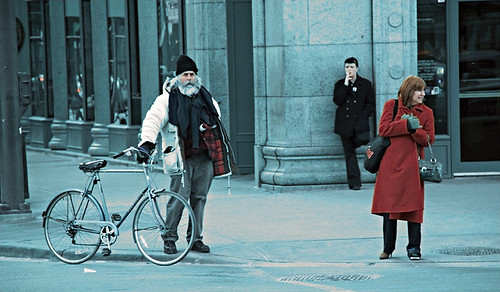
All well and good, and even cool, but what about making the bike lanes passable and safe for actual bikers instead of theoretical bikers? Just yesterday, a 19 yr. old woman was killed on her bike, hit by a garbage truck. Granted she probably was being unsafe, but still…
Mayor’s latest idea import: Bike rentals:
Mayor Richard Daley, known for taking early-morning rides along the lakefront, just loves bicycles, and he delights in getting ideas from other cities.
So is it any wonder that Daley is eyeing a bike rental program that could make Chicago just a little bit like Paris?
On the other hand, could a ride down a Michigan Avenue jammed with short-tempered rush hour motorists possibly compare with a leisurely cruise along the banks of the Seine?

Also, talk is cheap, remember this program, launched with great fanfare a few years ago?
Daley also tried Venice-like gondola service on the Chicago River a few years back. The businessman who won city approval for that one is now nowhere to be found.
Though to be fair, I think the Wacker Drive reconstruction also happened that same summer, and many businesses along Wacker suffered.
More, including this understatement:
In Paris, Daley said he wants to have a bike program “very shortly” but noted that Chicago was less “cycle-compatible” than Paris…
Paris’ program, much bigger than what Daley envisions here, now provides 40,000 trips daily, said Rob Sadowsky, executive director of the Chicagoland Bicycle Federation.
“That’s a lot of people not riding a car that day. … That is a lot of carbon not being put into the air,” he said. Other benefits include less auto congestion and exercise for the user, he said.
Sadowsky visited Lyon, another French city with a similar program, about two years ago and briefed Chicago’s transportation commissioner and the mayor shortly thereafter. Daley already had been told of Lyon’s program by that city’s mayor, Sadowsky said.
Two companies have made proposals for Chicago: OYBike, which has a rental operation in London, and JCDecaux, a French company that operates the Paris and Lyon programs and that won a controversial bus shelter contract in Chicago several years ago.
Chicago’s request for proposals asked interested companies to submit a 500-bike plan and a separate 1,500-bike plan for operations in the central part of the city. City Hall left it up to the firms to come up with financial plans, and now, the proposals are being evaluated.
In Lyon, Sadowsky said, JCDecaux struck a deal with the city to operate the bike program and also erect bus shelters, obtaining the right to sell advertising on the shelters in return.
Riders in Lyon pay 5 Euros, about $7, for an annual membership and agree to be charged as much as 150 Euros for any damage to the bikes while in their possession, he said. The first half-hour of use is free, with a charge of 1 Euro for each 30 minutes thereafter.
“Most people are using [the bikes] for 22 minutes,” Sadowsky said. “They figure it out. They go from place to place. You don’t have to return to the same place.”
The heavy-duty bikes cost about $2,000 each and have proprietary technology that prevents components such as seats and wheels from being removed without special tools, Sadowsky said. When a bike is returned to a station, it is slid into a device that lets JCDecaux know electronically that a rider has deposited it and that it is available for another rental, he said.
When Sadowsky checked out a bike, he found that its handlebars were flimsy, and he immediately returned it to the docking device. An electronic message asked if there was a problem. When he responded that there was, the light on the device went from green to red and a message was transmitted to advise JCDecaux personnel that maintenance was needed, he said.
The system “is brilliant and so finessed that it becomes easy for the user,” he said.


